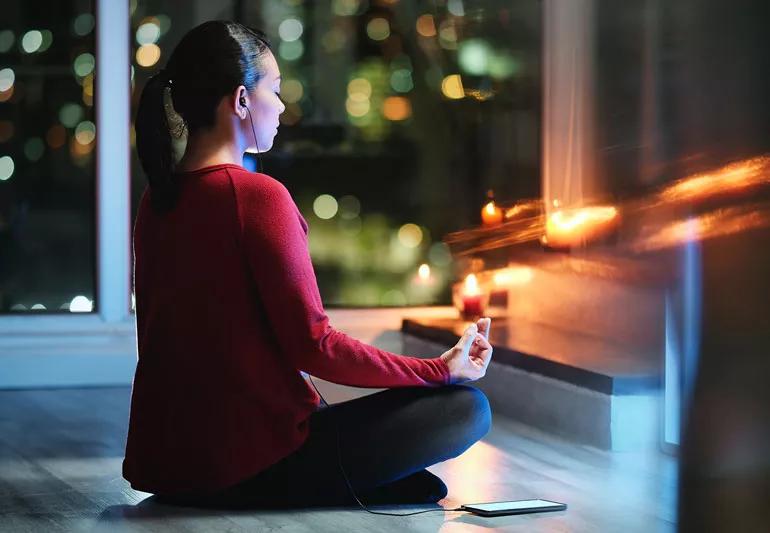You can beat insomnia by following these tips

Image content: This image is available to view online.
View image online (https://assets.clevelandclinic.org/transform/d0a5b392-61ab-4404-82fb-c57f1dc45e0d/relaxSleepNight-1220850236-770x533-1_jpg)
woman practicing yoga before bed
Have trouble falling asleep, staying asleep or just feeling rested?
Advertisement
Cleveland Clinic is a non-profit academic medical center. Advertising on our site helps support our mission. We do not endorse non-Cleveland Clinic products or services. Policy
The bad news is that it may be due to personal lifestyle habits. However, the good news is that those are easy to change to help get you on your way to sleeping better, says behavioral sleep medicine specialist Michelle Drerup, PsyD, DBSM.
Some people lay in bed staring at the ceiling in part due to chronic pain, depression, medications or other substances that can interfere with sleep. When you treat those issues, often it will naturally help improve your ability to sleep.
However, despite addressing other medical or psychiatric conditions, sleep difficulties often will persist. People who have chronic insomnia worry excessively about sleep and the effects of insomnia. They also become more and more agitated and tense as bedtime gets closer.
“If you’re very worried about getting good sleep, you can put a lot of effort into getting sleep and have a lot of anxiety at night,” says Dr. Drerup. “This makes you more alert and can keep you lying in bed wide awake.”
Dr. Drerup offers some suggestions that can help improve your sleep habits, including individuals who suffer from chronic insomnia. Trying to break some of the patterns that you may have developed is often the key.
You can improve your sleep by ensuring that you have a consistent sleep schedule. Avoid staying up late on weekends and sleeping in, then trying to go to bed at your regular time on Sunday night.
Advertisement
“We call it social jet lag because it’s like you’ve flown to California, and now you’re trying to adjust back to the time zone difference,” explains Dr. Drerup. “So, keep those times as consistent as you can.”
Going to bed early or sleeping in to catch up only leads to more fragmented and poor quality sleep. Typically, you go to bed two hours early and then just lay there wide awake, continuing to associate your bed with not sleeping.
Quiet time is worth its weight in gold. Give yourself at least 30 to 60 minutes of quiet, relaxed time before bed as a buffer. Nix phone screen time and replace it with reading a book, listening to calming music, taking a warm bath or having some decaffeinated herbal tea.
If you can’t fall asleep, get up and try to restart by doing something to distract yourself before going back to bed.
“It could be flipping through magazines, calming yoga stretches or some type relaxing hobby like knitting or coloring,” she says. “Avoid anything that’s goal-directed or too physically or mentally activating such as house chores, paying bills or working on a computer.”
While it may be tempting to grab your phone off your nightstand and scroll endlessly through social media, don’t. The blue light emitted from your phone or tablet screen can inhibit your natural melatonin production which is a hormone that is involved in the timing of our internal circadian sleep clock.
Learning relaxation techniques such as meditation, guided imagery and progressive muscle relaxation can go a long way in helping you fall asleep. A sleep specialist can help you learn this as well as ways to calm your mind and your muscles and reduce or eliminate all the racing thoughts and worries. Dealing with stress in a healthy way is important for not only sleep, but your overall health, too.
“Practice the relaxation techniques and develop them as a skill during the day when you feel good and are already calm, rather than trying to do them for the first time at bedtime,” says Dr. Drerup.
Think of this as the adult sister to that diary you’ve kept in middle school.
“You can track the details of your sleep patterns and lifestyle habits,” she says. “This can help you see trends in your behavior and will be useful when you discuss your insomnia with your doctor or a sleep disorder specialist. “
If writing things down the old fashioned way isn’t your jam, try smartphone apps or your smartwatch to help you keep a log. The Sleep Foundation has a sample sleep log that you can download and print out, too. Remember, it doesn’t have to be complicated to work.
Advertisement

Delivered every Tuesday!
Sign up for our Health Essentials emails for expert guidance on nutrition, fitness, sleep, skin care and more
It's a letter about the news!
Learn more about our editorial process.
Advertisement
Keeping a sleep diary and seeing a sleep specialist can help you stay asleep and get the ZZZs you need
Does this supplement help you get more ZZZ's
Here's how to get some rest in the face of pandemic-caused insomnia
The scoop on magnesium sleep aids
An expert discusses what effects, if any, vitamins have on your ability to sleep
What to do when your worries are keeping you from sleep
Find out where you could be going wrong and how to get back to sleep
Here's why you might want to give it a try
Type 2 diabetes isn’t inevitable with these dietary changes
Applying a hot or cold compress can help with pain
Pump up your iron intake with foods like tuna, tofu and turkey